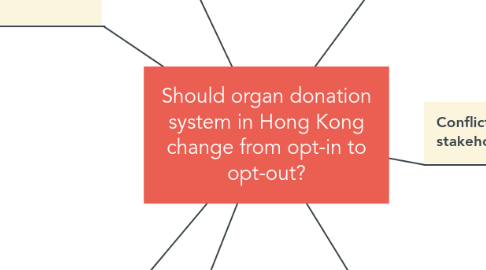
1. Reasons for changing from opt-out to opt-in
1.1. Social Aspect
1.1.1. Lack of voluntary organ donors
1.1.1.1. V
1.1.1.1.1. Long queuing time for organs, lead to several death cases
1.2. Political Aspect
1.2.1. Citizens/Family of patients who required organ donations urged the government to solve the problem of lack of organs for transplanting
1.2.1.1. Dissatisfaction of citizens towards the government
1.2.1.1.1. Government performances are worsened
2. Obstacles for introducing the new system
2.1. Minimum age requirement
2.1.1. Difficult to set up the suitable age for this system
2.2. Traditional concepts
2.2.1. Chinese traditional concept
2.2.1.1. Keeping the whole body after death(留全屍,入土為安)
2.2.1.1.1. Desecrating a corpse
2.2.1.2. Uphold filial piety
2.2.1.2.1. Not injuring nor damaging the body which is given by your parents. (身體髮膚,受之父母, 不敢毀傷,孝之始)
2.2.1.3. Removing organs from dead are "desecrating a corpse"
2.3. Human rights
2.3.1. Should be a choice for everyone to make the decision of donating organs
2.3.2. May be discriminated if some sign up for not donating organs
2.4. Wrong interpretation from citizens
2.4.1. Unclear information or lack of
3. Related Modules
3.1. Hong Kong Today
3.2. Modern China
3.3. Globalization
3.4. Public Health
4. Conflicts between different stakeholders
4.1. Citizens who hold traditional concepts or beliefs VS Government
4.1.1. Different focus on social and personal interests
4.1.1.1. Citizens may find organ donation violating some traditional concepts and are prone to objects on the opt -out system as it make everyone to donate their organs unless you signed up for not doing it
4.1.1.2. Government focuses more on the quality of life of citizens and to solve the social problems of lack of organs for transplant
4.2. Human rights organisation(NGO) VS Government
4.2.1. Different ideologies
4.2.1.1. NGO considers that human rights are more important
4.2.1.1.1. Some people(especially elders) might not know about the opt-out system even when they're dead, might be violating their wills and rights
4.2.1.1.2. Organs are a part of the belongings of human even when they're dead
4.2.1.2. Government considers that the life of citizens as well as lengthening the life expectancy is more important
5. Positive impacts
5.1. Social
5.1.1. Increase number of organ donations
5.1.1.1. Solve the problem of lack of voluntary organ donors and long queuing time for transplant of organs of patients
5.1.1.1.1. Reduce the number of death due to lack of organ donations
5.2. Political
5.2.1. Solve the problem of long queuing time for transplant of organs
5.2.1.1. Enhance government performances
5.2.1.1.1. Greater satisfaction towards the government
5.3. Economic
5.3.1. Increase job opportunities
5.3.1.1. More variety of jobs/newly developed jobs are given out
5.3.1.1.1. For example workers who specify in determining the states of those organs taken from the body
5.3.1.2. Greater quantity of workers will be required
5.3.1.2.1. For example, the government requires more workers to check out on the newly developed system
5.3.1.3. Ease the problem of high unemployment rate
5.3.1.3.1. Quality of life of citizens is enhacned
6. Negative impact
6.1. Social
6.1.1. Social cohesion in the society may be negatively affected
6.1.1.1. Conflicts arise between citizens which hold different thoughts and the government
6.1.1.1.1. Society become stressed due to social disharmony
6.2. Social
6.2.1. Humans' right is challenged
6.3. Political
6.3.1. Lack enough vacancy in hospitals due to more transplantation of organs are being carried out ( expected )
6.3.1.1. Government performance is worsened
6.3.1.1.1. Less satisfaction towards the government
7. Pros and cons of Opt-out system over Opt-in
7.1. Pros
7.1.1. Increase the number of donors
7.1.2. Help those who are willing to sign up for organ donation to make the move
7.1.2.1. As part of them are willing but haven't signed up for the afterlife organ donation
7.1.3. Help making decisions for families whe
